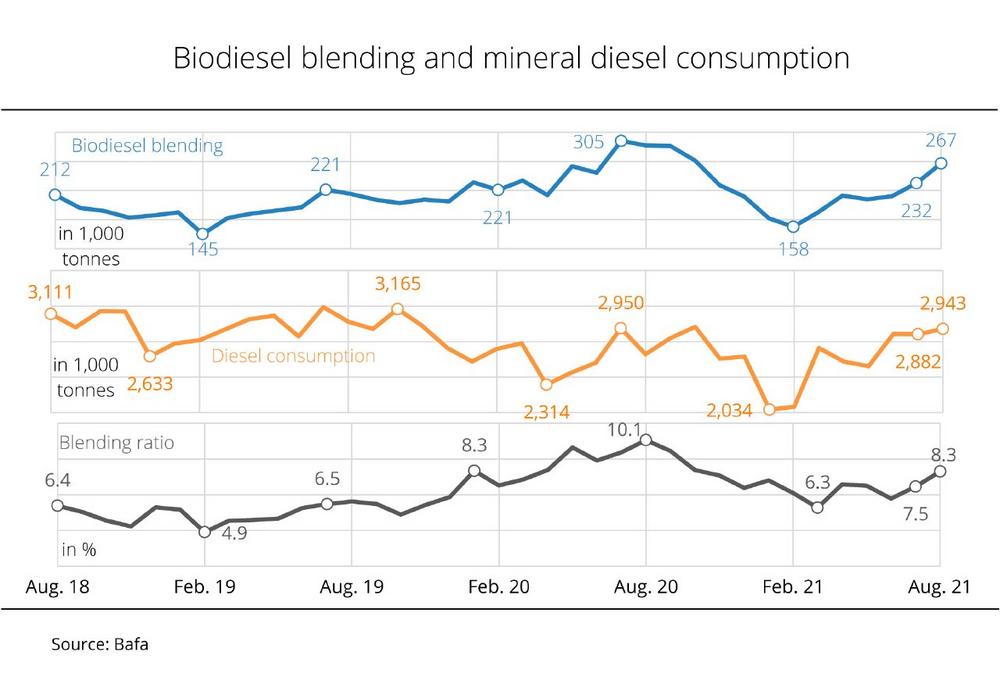In August 2021, 266,710 tonnes of biodiesel were used for blending, which was up 15 per cent on the previous month. Since at the same time, consumption of diesel increased only 2 per cent to 2.9 million tonnes, the incorporation rate rose to 8.3 per cent. Consequently, total consumption of diesel and biodiesel amounted to 3.2 million tonnes in August, which was down 1.6 per cent compared to August 2020. In the period from January to August 2021, consumption of biodiesel totalled 1.6 million tonnes, whereas the incorporation rate averaged 7.3 per cent, comparing to 8.8 per cent in the same period last year.
The Union zur Förderung von Oel- und Proteinpflanzen (UFOP) has pointed out that the standard for diesel fuel, DIN EN 590, places a cap on the percentage of biodiesel at 7 per cent by volume. The blending percentage exceeding this limit is hydrotreated vegetable oil (HVO). The association has contended that these volumes are still not listed by the Federal Office for Economic Affairs and Export (BAFA).
The UFOP estimates biodiesel/HVO demand at approximately 2.5 million tonnes for the calendar year. In other words, sales are seen to decline approximately 0.5 million tonnes on the extreme year 2020. According to European Fuel Quality Directive regulations, EU member states had to reduce emissions by 6 per cent the previous year without being permitted to carry over quotas. This meant they had to meet GHG quota obligations mainly by means of physical material. The carryover option to meet climate protection targets has only been reintroduced in 2021. Another reason for the decline was the continuous decrease in demand for diesel and energy due to the growth of e-mobility and the superior energy efficiency associated with this type of powertrain.
However, the UFOP has underlined that more than 35 million cars will still be powered by combustion engines in 2030, the target year of the European Climate Law and German Climate Change Act (the latter having been toughened just this year, especially as regards the transport sector). The association has explained that in order to meet the GHG quota obligation, which will gradually rise to 25 per cent by 2030, and emission requirements, the world needs any and all options without giving preference to any specific technology and that such options would include certified sustainable greenhouse gas-efficient biofuels from cultivated biomass, residues and wastes. Looking at products that do not need to meet requirements of the same standard, the UFOP has pointed out that proof of sustainability should be the "permit" to access the market and being granted credits towards the cap on GHG emissions.
The Union for the Promotion of Oil and Protein Plants e. V. (UFOP) represents the political interests of companies, associations and institutions involved in the production, processing and marketing of domestic oil and protein plants in national and international bodies. UFOP supports research to optimise agricultural production and for the development of new recycling opportunities in the food, non-food and feed sectors. UFOP public relations aim to promote the marketing of domestic oil and protein plant end products.
UFOP – Union zur Förderung von Oel- und Proteinpflanzen e.V.
Claire-Waldoff-Str. 7
10117 Berlin
Telefon: +49 (30) 2359799-40
Telefax: +49 (30) 2359799-99
http://www.ufop.de
Union zur Förderung von Oel- und Proteinpflanzen e
Telefon: +49 (30) 31904-434
Fax: +49 (30) 31904-485
E-Mail: m.leonhard@ufop.de
![]()

